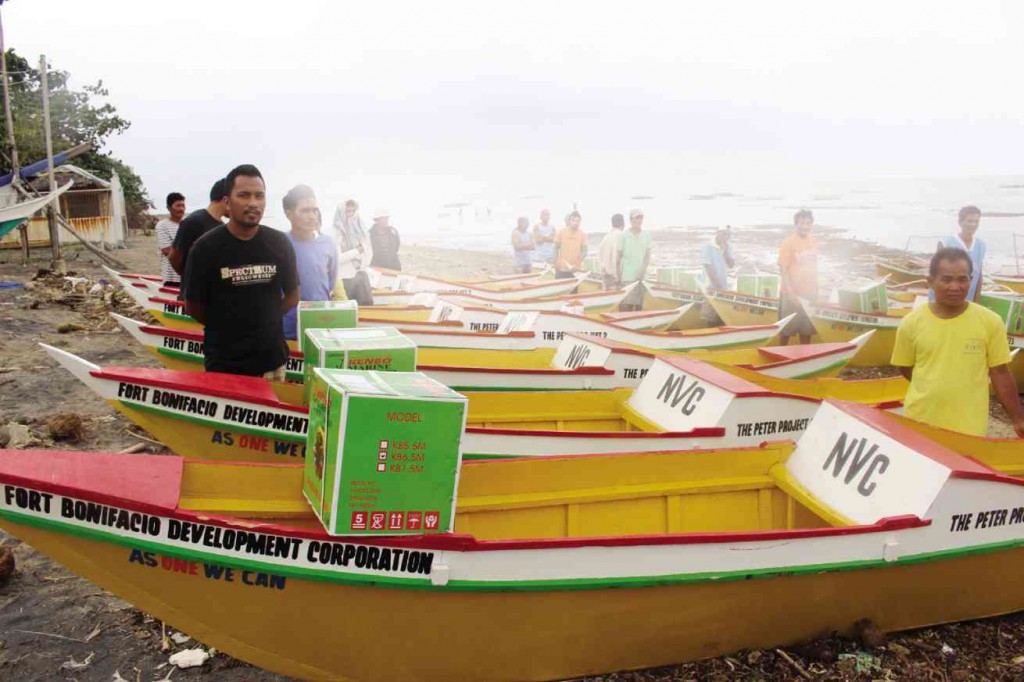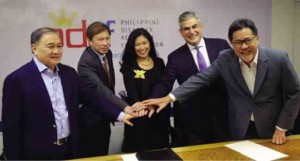Year after ‘Yolanda’, private firms keep up support

Through the “Peter Project,” dozens of fishermen received new boats to replace their damaged or destroyed vessels. Made of fiberglass instead of the traditional wood, the new boats allow the men to go farther into sea and catch larger fish.
MANILA, Philippines–When it comes to helping communities devastated last year by Super Typhoon “Yolanda,” there is no room for competition.
This is why some of the largest corporations have come together to contribute to rebuilding lives and livelihood damaged by the strongest typhoon to ever make landfall.
Leading the involvement of the country’s biggest businesses is the Philippine Disaster Recovery Foundation, co-chaired by Ayala Corp. CEO Jaime Augusto Zobel de Ayala and PLDT and Smart chair Manuel V. Pangilinan together with Manila Archbishop Luis Antonio Cardinal Tagle.
By working with national government agencies and local government units, as well as non-government organizations such as the Red Cross, Habitat for Humanity, Caritas, and Gawad Kalinga (GK), the private sector is helping return a sense of normalcy in affected areas.
There are now new homes, sources of income, schools, and health and social services in the hard-hit areas, all thanks to the Filipino practice of bayanihan.
For many in the private sector, the rapid and massive relief and rehabilitation work came naturally by virtue of their own areas of expertise and reach, existing corporate social responsibility programs and networks, and the firm belief that business success is made possible by the continuous development of its communities.

Sealing the partnership for a collaborative private sector response to disasters are (from left): PLDT chair and PDRF co-chair Manuel V. Pangilinan, PDRF president Rene S. Meily, IBM Philippines president Mariels Almeda Winhoffer, Ayala Corp. CEO and PDRF co-chair Jaime Augusto Zobel de Ayala and NCC co-chair and PDRF Advisor Guillermo Luz.
Manila Water, for example, shipped Baso Water (clean, potable water in sealed cups) to Leyte and sent a mobile water treatment plant to Bantayan Island, Cebu. Globe’s engineers worked round the clock to restore vital communications services even as it set up free phone call, charging and Internet stations.
Ayala Land, which had just celebrated its 25th anniversary, used the occasion to rally its employees to donate and volunteer for its Alay sa Visayas relief efforts.
Local and foreign donations were also deployed by well-established programs such as Ayala Foundation’s Laging Handa, ABS-CBN’s Sagip Kapamilya, and Globe’s Bangon Pinoy.
Foreign partners of Ayala companies-Mitsubishi Corp., Singapore Telecom, Optus, Amdos, Tobii, and Volkswagen, to name a few-provided aid in solidarity with the Filipino people.
In all, the Ayala group raised more than P400 million from its business units, partners and merchants, employees, individual and institutional donors, and the general public here and abroad.
A year after Yolanda hit, Ayala subsidiaries Ayala Land, Globe, Bank of the Philippine Islands, and Ayala Foundation in particular continue to implement programs on the ground, serving as channels of the entire group. These programs continue to be directed to rebuilding homes, classrooms, and fishing boats, rehabilitating destroyed farms and providing support for small start-up businesses.
“We believe in integrated, sustainable solutions for our communities. This is why we consider strategic partnerships an important factor in ensuring the success of any undertaking, especially in relation to rehabilitation after Typhoon Yolanda,” said Ayala Foundation president Luli Heras-de Leon.
The crucial next step is for survivors to “build back better”—making sure that shelters are built stronger and in safer locations, livelihood is regained and sustained, and communities are better prepared for natural calamities.
And when government, businesses, NGOs, citizens, and affected communities work together, innovative and sustainable solutions inevitably emerge.
An example of this kind of synergy at work happened in May, six months after the typhoon. Nearly 22,000 families in North Cebu and Leyte signed up for a unique program that involved a private bank, a global humanitarian agency, and a nonprofit.
Together, BPI Globe BanKO, Mercy Corps and IDEO.org channeled more than P87 million in relief funds to Yolanda survivors through mobile cash transfers. With relief comes empowerment, as these households are now saving money securely for the first time.
Much work remains to be done: roads and bridges to repair, community services to restore, livelihood to regain.
With the continuing response and cooperation of public, private, and civic sectors, and the overwhelming support given by individual donors, volunteers, and the international community, recovery is not only possible, but inevitable.














